
Worcester

College of Education
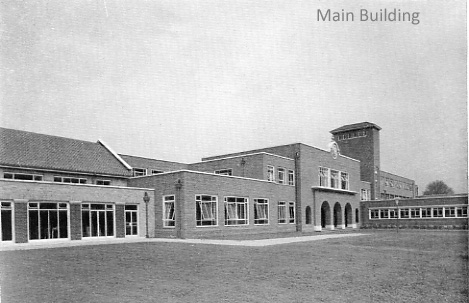
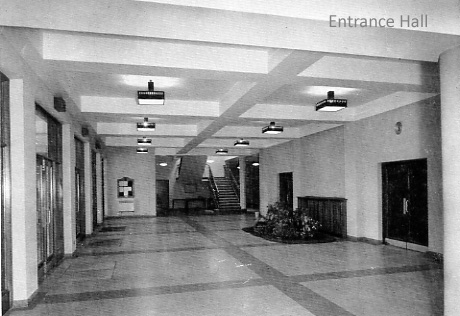
PROSPECTUS
E. G. PEIRSON,
M.A., B.Sc., J.P.
Principal,
Henwick Grove
Worcester
Tel. No.
Worcester 25131
ACADEMIC STAFF
P. E. Sangster, M.A., B.Litt., D.Phil., L.R.A.
Education
R. P. R. Westgate, B.Sc., Ph.D.,
A.K.C.
Miss E. Dodge, L.R.A.M.
J. C. Jones, B.Sc., (Sociology)
G. C. Boyle, M.A.
H. J. Checketts, B.A.
D. E. Davies, B.A. (Corn.)
G. B. Davies, B.Sc. (Econ.)
Mrs. R. Howard, M.A.
K. O. Horton, BA., M.Ed.
P. G. Hytch, B.Sc. (Econ).
R. D. Kitchen, B. A., A.L.C.M.
Miss B. Sheridan
Art
and Crafts
N. J. P. Turnbull, A.T.D.
Miss J. M. Austin, A.T.D.
P. Nicholson
Miss H. V. Simpson, N.D.D., A.T.D. Divinity
J. W. E. Dunn, M.A., B.D., Ph.D.
Domestic Science
Miss J. Spalton
Miss P. Baker
Miss M. F. Davies
Miss B. M. Stevens
English
F. Grice, B.A.
M. E. Burrows, M.A.
D. C. Brazil, B.A.
Miss M. Croxson, B.A.
P. H. Cushing, M.A.
V.J. Hext, B.A.
C.
W. Kemp, B.A.
Geography
G.
W. Lovatt, M.A., B.Sc. (Econ.)
R. S. Lodge, B.A.
L. Morris, B.Sc.
Handicraft
J. C. Wilson
K. G. Edwards
History
J. A. Johnston, M.A.
M. O. Harrison, B.A.
Mathematics
C. Hope, O.B.E., B.Sc., F.I.M.A.
Miss I. L. Campbell, B.Sc.
J. Denniss, B.Sc.
G. Lee, M.Sc.
Miss J. A. Patterson, B.Sc.
D. J. H. Phillips, L.R.A.M.
Miss S. A. Stewart, B.Sc.
Movement and Dance
Miss J. M. Russell, F.L.G.
H. Watkins Shaw, M.A., F.S.A., F.T.C.L. Mrs E. J. Kerney, L.R.A.M. (visiting teacher of Piano)
Needlecraft
Miss E. Ward, N.D.D.
Miss E. M. Kevan, N.D.D., A.T.D.
Physical Education
M. W. Randall
Miss M. Randall
J. W. Lloyd
Miss B. White
Rural
Studies
F. G. Saunders, B.Sc. (Agric.)
R. W. Major, L.C.P.
P. G. Jackson
F. Lambert
J. Oates, B.Sc. (Agric.)
Miss E. L. Rolfe
J. Ryding B.E.M., B.Sc. (Agric.)
G. E. Simmons
Science
W. S. Smith,
B.Sc.
E. J. Wenham, B.Sc., A.lnst.P., A.K.C.
M. K.
Bowker, B.Sc.
G. W. Dorling, BA.
M. J.
Hickling, B.Sc.
A. R. D. Hunt, B.A.
J. N. Ogborn, B.A.
M.Taylor,
M.A., F.C.S.
D. J. Withnall, B.Sc.
Sociology
M. D. Shipman, B.Sc. (Sociology)
Librarian
P. A. I. Worner, M.A.
ADMINISTRATION
Bursar
Lieut.-Comrnander T. A. Finigan, R.N. (Ret’d.)
Assistant Bursar
F. C. Driskell
Registrar
H. Smith
Lodgings Officer
J. A. Hickling
Maintenance Engineer
F. Thompson
Principal’s Secretary
Miss D. M. Crowsley
Vice-Principal’s Secretary
Miss L. Lee
MEDICAL SERVICE
Medical Officer
Dr. H. S. O’Conor
Matron
Miss F. C. Bunce, S.R.N., S.C.M.
THE WORCESTER COLLEGE OF EDUCATION was established in
1946 and is a constituent college of the University of
Birmingham Institute of Education.
The College is situated in an attractive estate of over
50 acres which includes a model farm, extensive gardens and
playing fields. The main building, completed in 1962, provides
excellent teaching facilities and there is good residential
accommodation in single and double study-bedrooms for 470
students.
The College is expanding to 920 students (520 women and
400 men) by 1967 and work is now in progress on the additional
buildings required for this. During the academic year 1966/7
there will be 850 students.
The following courses are provided:
(1) Three-year course
for teachers in Primary and Secondary Schools.
(2) Three-year course
for specialist teachers of Domestic Science
(3) Three-year course
for specialist teachers of Rural Studies.
(4) Three-year course
for specialist teachers of Science.
(5) One-year course for
specialist teachers of Rural Studies.
This course is open only to those already holding a degree or diploma in
horticulture, agriculture or dairying. For details see separate
prospectus.
(6) One-year
supplementary courses for qualified teachers in:
(a) English
(b) Mathematics
(c) Rural Studies
(d) Science
For details of these courses please see separate leaflets.
Students who successfully complete a course of initial
training (courses I to 5 above) are awarded the Certificate in
Education of the University of Birmingham Institute of Education
which leads to recognition by the Department of Education and
Science as a qualified teacher.
Candidates for admission to three-year courses must:
(I) satisfy the
College Authorities that they intend to adopt the profession of
teacher in a grant-aided school,
(2) have reached the age
of eighteen years by October I st of the year of entry (no
exception can be made to this rule),
(3) pass a medical
examination,
(4) have attained the
following minimum academic qualifications:
(i)
a School Certificate passed in 1950 or earlier or
(ii)
a General Certificate of Education with passes in (a)
five subjects at ordinary level; or (b) three subjects at
ordinary level and one other subject at advanced level; or (c)
two subjects at ordinary level and two other subjects at
advanced level; or (d) three subjects at advanced level provided
that there is evidence that other courses have been studied
beyond the minimum age for entry to the examina tion. In
exceptional circumstances it is possible for candidates to be
admitted without these qualifications if they have other
qualifications which fit them for training as teachers.
Note: Other things
being equal preference will be given in selection to those
candidates who have taken or intend to take before entering
College at least one subject in the G.C.E. at advanced level.
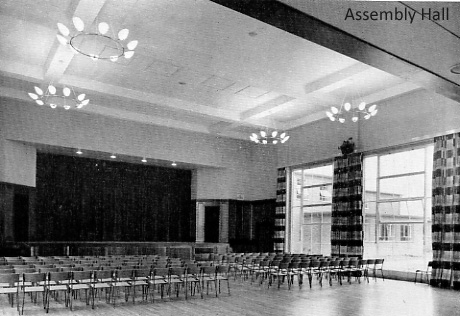
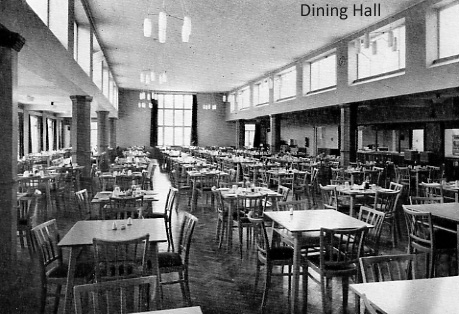
THREE-YEAR GENERAL COURSE
SECTION I. EDUCATION (Philosophy, psychology and
sociology of education) SECTION 2. SUBJECT COURSES
One principal subject to be studied throughout the three years, and one
subsidiary subject to be studied during the first two years
only.
For time-table purposes, subjects are arranged in three groups (A, B and
C) and students must choose their principal and subsidiary
subjects from different groups.
Subject groupings are as in the following tables:
Group A
Group B
Group C
Divinity
Art and Craft
Biological Science
English
Geography
English
History
Handicraft
Geography
Mathematics
History
Mathematics
Movement and Dance
Needlecraft
Rural Studies
Physical Education (women)
Physical Education (men)
Music
Sociology
Note: Students taking Mathematics at principal level may take Physical
Science as their subsidiary subject.
SECTION
3.
PROFESSIONAL COURSES:
(a) Compulsory for
all students:
English (including speech training)
Art and Craft (lettering, model-making, display)
(b) Courses
selected to suit individual needs:
(i) Students
intending to teach in Primary Schools will take courses in the
teaching of Mathematics, Physical Education and Religious
Knowledge together with one optional course selected from the
following:
Needlecraft, Music, Dance, Drama, Divinity, Social
Studies, Remedial Education, Handicraft, Science.
(ii) Students who
may teach in either Primary or Secondary Schools will take
courses in the teaching of Mathematics and Physical Education
together with one optional course selected from the list given
under (i) above.
(iii) Students preparing
to teach as subject specialists in Secondary Schools will take
one ancillary course (Mathematics, Divinity or Social Studies).
SECTION 4. TEACHING PRACTICE
All students will be required to complete a minimum of 4 weeks teaching
practice. The practising schools are situated in five counties
(Herefordshire, Oxfordshire, Shropshire, Warwickshire,
Worcestershire) enabling students to obtain experience of
schools in both urban and rural areas.
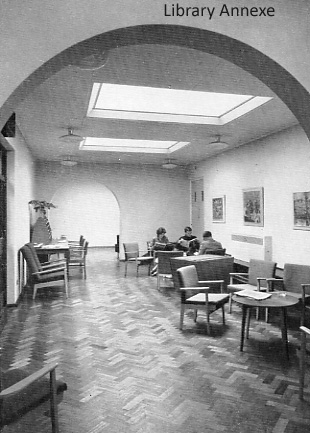
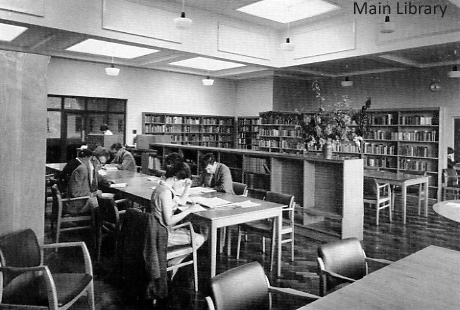
THREE-YEAR COURSE IN DOMESTIC SCIENCE
The course is designed for those who wish to train as
specialist teachers of Domestic Science in secondary schools.
There will be two groups in each year, group A being for those
having a special interest in rural life and wishing to teach in
rural schools or become instructresses in Rural Domestic
Economy.
The curriculum is broadly the same as that outlined
above, but all students take Science in Section 3 in place of
one of the ancillary subjects listed in paragraph b (iii).
Subject courses under Section 2 are as follows:
Group A.
Principal
subject:
Housecraft (Home management, Cookery)
Subsidiary subject: Rural Studies (Horticulture,
livestock management, dairying)
Group B.
Principal
subject: Housecraft (Home management, Cookery) Subsidiary
subject: Needlecraft
Teaching practice is arranged to give experience in
both urban and rural schools having good facilities for the
teaching of housecraft and allied subjects. Those who may wish
to take up appointments as instructresses in Rural Domestic
Economy will be given opportunities for work with adult groups.
THREE-YEAR COURSE IN RURAL STUDIES
The course is designed for those who wish to qualify as
specialist teachers of Rural Studies. The farm, with its variety
of pedigree stock, and the extensive flower, fruit and vegetable
gardens provide excellent facilities for varied practical work
to enable students to become proficient in all the most
important farm and garden operations and to tackle the
organization of a school farm or garden with confidence. As the
College provides a three-year course for teachers of Rural
Domestic Economy, students taking the special course in Rural
Studies will have opportunities to assist in the processing of
the products of the garden, orchard and farm.
The curriculum is as outlined for the three-year
general course, subject courses under Section 2 being as
follows:
Principal subject: Rural
Studies (Agriculture, Horticulture, Rural Crafts) Subsidiary
subject: Rural Science.
Teaching practice is arranged in schools which have
well developed courses in Rural Studies and good facilities for
this work.
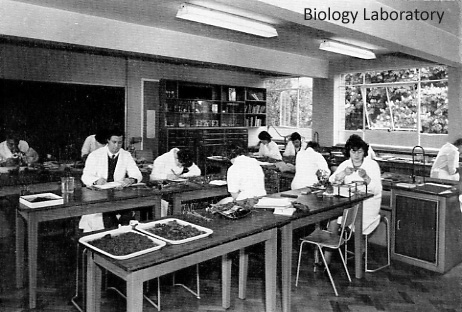
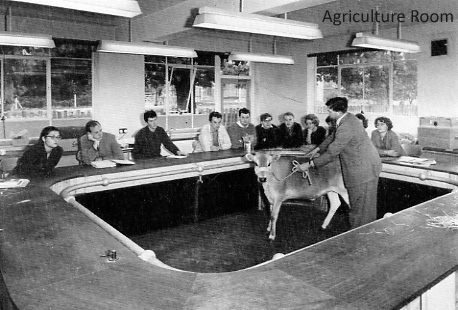
THREE-YEAR COURSE IN SCIENCE
This course is designed for those who wish to qualify
as specialist teachers of Science in secondary schools. All
students will study the three main branches of Science, Biology,
Chemistry and Physics, but will take either the Biological
sciences or Physical sciences to a more advanced level. The
course will also include Meteorology, Geology, Astronomy and
Photography.
Throughout the course emphasis will be placed on
practical work both in the field and in the laboratory.
The curriculum
is
as outlined for the three-year general course, subject
courses under Section 2 being as follows:
Group A.
Principal
subject:
Biological Science.
Subsidiary subject: Physical Science
Group B.
Principal
subject:
Physical Science
Subsidiary subject: Biological Science.
Teaching practice is arranged to give opportunities for
specialist science teaching in schools with well-equipped
laboratories.
GENERAL INFORMATION
RESIDENCE
Students admitted to the three-year course as resident
students will spend one year in recognized lodgings and two years in a hall of
residence. The College Lodgings’ Officer makes all arrangements for the
accommodation of resident students in lodgings.
BOOKS AND EQUIPMENT
Students are expected to provide their own books,
stationery and other materials needed for the course. The maintenance grant paid
to recognized students includes an element of 35 per year for this purpose.
Uniform clothing is required for certain activities
such as physical education, dance, domestic science; details will be provided
with the joining instructions sent to accepted candidates before the course
commences.
MEDICAL SERVICES
A well-equipped Sick Bay is provided under the charge
of a fully qualified Matron, and the College Medical Officer pays regular
visits. Students should register with the College Medical Officer for the period
of the course.
UNION SOCIETY
The Union Society is an autonomous body having full
responsibility for promoting athletic, cultural and social activities for the
College through its affiliated clubs and societies. Its affairs are governed by
a Council consisting of elected repre sentatives of the student body. All
students become members of the Union Society on joining the College.
The Society has built up a flourishing community life
and its societies cater for a wide range of interests. There are good facilities
for games and provision is made for Cricket, Association Football, Rugby
Football, Hockey, Tennis, Basketball, Net ball, Badminton, Athletics, Swimming,
Lacrosse, Rounders, Canoeing, Table-tennis and Fencing.
The beautiful surrounding countryside of
Worcestershire, Herefordshire, Shropshire and Gloucestershire gives exceptional
scope for rambling and cycling, the Malvern Hills and the Cotswold country being
within easy reach. There are also frequent excursions to the Royal Shakespeare
Theatre at Stratford-on-Avon and to other places of interest in the
neighbourhood.
GRANTS
Students who are normally resident in England and Wales
and who intend to teach in a grant-aided school on completing the course are
eligible for grant aid. For single resident students the maximum grant covers
the full cost of tuition, board and lodging and a personal allowance of £156 per
year: day students receive a maintenance allowance in lieu of board and lodging.
Students who are married when they commence the course may be eligible for
dependants’ allowances. Full details are given in Ministry of Education Form 101
R.T.C. which may be obtained on application to the office of any Local Education
Authority.
APPLICATIONS
Applications for admission should be made on or after
8th October in the year preceding entry. All correspondence relating to
admission should be addressed to the Registrar, Worcester College of Education,
Henwick Grove, Worcester.

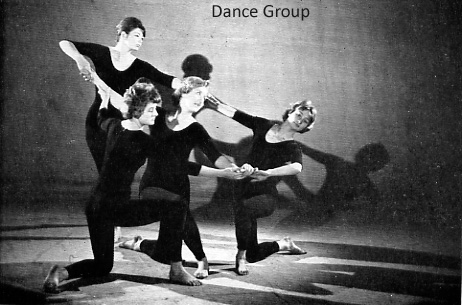
Sunday Mercury Article February 16th
1969
Hard Work and Harmony
WHERE THE STUDENT IMAGE IS BRIGHT
THE student image is at its lowest ebb. Public goodwill has been
soured by unkempt young people lolling arrogantly in ransacked
offices, squatting in passive disobedience and preaching anarchy
and disruption
Yet
there are students - many more than most of us would believe—who
work hard, play hard and who, because they have proved they are
responsible, have achieved much more than their militant
contemporaries.
Worcester College of Education (motto: We aspire to inspire) is
one institution where hard work and harmony prevail. The college
has won the respect of the cathedral city which is its home.
The 1,000 students, through a Joint Academic Consultative
Committee of staff and students, have a say in what they may
learn and how it is taught. The committee of 16 has a student
chairman and, says the Students’ Union President, Alan Porter:
“There is no question of our being under the thumb.”
Set up after the Second World War in a cluster of drab concrete
huts, the college catered for teachers’ emergency training. Good
social foundations were laid in an atmosphere where many of the
war-veteran students were as old as the staff.
Today, two-thirds of the 1,000 students are resident on a
compact campus which also includes a miniature farm, a students’
bar and a well-equipped laundrette.
The Joint Academic Consultative Committee (JACK) is duplicated
by mini-JACKS in each college department, and each of the seven
halls of residence is administered by a joint committee of staff
and students whose terms of reference range from the provision
of facilities for brewing coffee to fixing the hours for mixed
visiting at night.
The Principal, Mr. E. G. Peirson, is a quiet man with liberal
views and a strong sense of fair play.
“I
expect my students to work hard,” he said, “but there must be
balance. If they spend 35 to 40 hours spread over a seven-day
week on course work then there is plenty of time for the social
side “In the 17 years I’ve been here students have changed
almost certainly for.. the better.
They
are more adventurous
“The
college attitude has changed, too. With 1,000 young men and women living so
closely together we are bound to have problems. If a girl comes to me and says
she is pregnant that doesn’t mean she cannot finish her course. Ten years ago
she’d have had to leave.”
Harmony between staff and students is complemented with harmony between the
college and the city
A recent Charities Week raised £1,700 for the handicapped children of Worcester,
and at present the students are looking round for more money to build an
adventure playground in the city.
A scheme is also going ahead to build an ornamental garden at the rear of Unity
House, the centre for Worcester’s handicapped.
At week-ends several students help out with driving for the city’s
meals-on-wheels service,
This is the sort of unselfish work and play that can bridge the gap between the
generations. The students at Worcester are helping build that bridge.
Article from Warwickshire &
Worcestershire Life November 1971
School for
Teachers
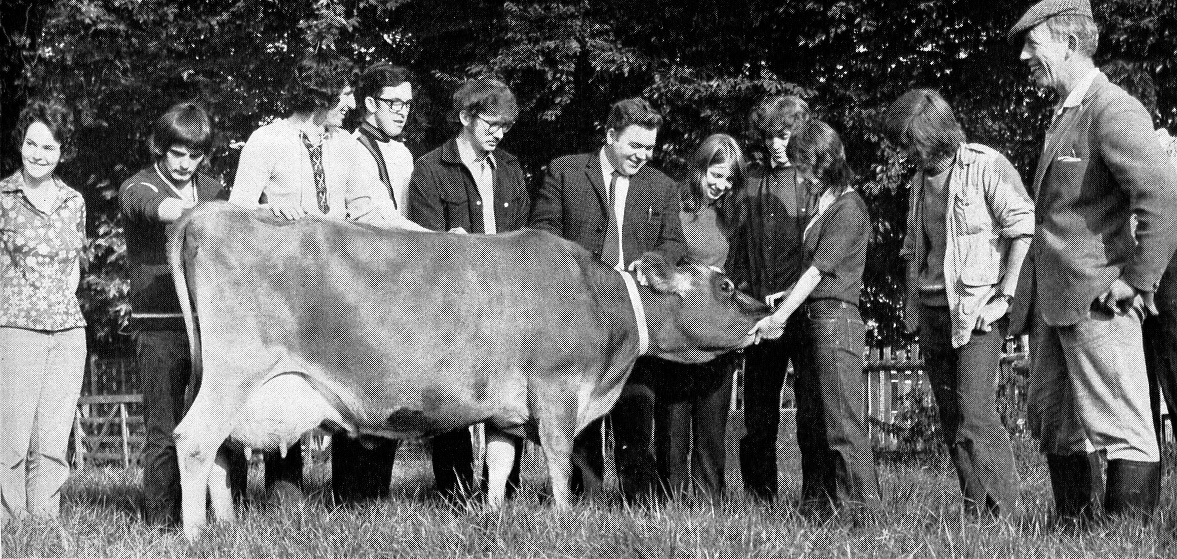
GILLIAN STATHAM takes a look at Worcester College of Education — where
potential teachers from a wide area are trained for their chosen career - and
discovers an understandable concern in the decline of employment opportunities.
Like many
similar colleges elsewhere, Worcester College of Education was opened in 1946 to
cater for the urgent post-war demand for teachers. This teacher shortage, due
partly to the anticipated school “bulge” and partly to the fact that few
teachers were trained during the war, continued for many years and only
comparatively recently has the situation changed. In fact, some newly qualified
teachers are now facing difficulty in securing employment—an entirely new
circumstance that is understandably causing concern among principals of colleges
of education.
“Indeed, we
have heard of some of our recently qualified students — often good ones —who
haven’t yet found jobs. We’re worried about it, because if it becomes generally
known, recruitment may be affected,” says Mr. E. G. Peirson, Principal of the
Worcester College of Education.
Today’s
difficulties, however, reflect the economic climate rather than a situation in
which every local authority has solved the staffing problems of its primary and
secondary schools.
Classes,
particularly in industrial areas, are often still too large, but shortage of
money for new buildings and extra staff is seriously limiting expansion. There
is, however, a good chance that the job situation will improve with the raising
of the school leaving age to 16 in the year 1972—73.
Always a mixed
college — with a ratio of two women to every man — Worcester is a constituent
college of Birmingham University’s School of Education. With approximately 1,1
50 students, it is one of the larger colleges in the West Midlands, and expects
its numbers to rise to 1,250. This figure would have been reached already had it
not been for what Mr. Peirson
describes as
“an unexpected increase in the wastage rate”. Over the whole three-year course
this is twelve per cent, and within the first year, eight per cent — affecting
men and women equally.
The reasons for
this increase—which began to be noticeable about two years ago—are, suggests
Mr. Peirson, two-fold. “Students who feel that teaching is not the right job for
them now face up to it, and drop out to look for alternative careers. In
addition, many students today seem to have formed stronger home attachments and
can’t cope with being separated from their boy or girl friends or from their
homes.” It would, no doubt, be reasonable also to assume that the increasingly
difficult employment position may have an affect on students’ future attitudes.
Students at
Worcester are drawn from all over the country; eighty per cent of those accepted
have a minimum of one “A” level and sixty per cent have at least two “A” levels.
The remaining twenty per cent comprise mature students with rather different
qualifications.
Apart from the
normal three-year course, the College offers one-term special courses in
physics, creative dance and rural crafts. In addition there are two one-year
courses in mathematics and English, and all these particular courses have proved
attractive to overseas students. Mathematics is, in fact, one of the College’s
strengths, and head of the department is Mr. Cyril Hope, director of the
Midlands Mathematical Experiment.
But perhaps the
most important course run at the College is that in Rural Studies, pioneered
twenty-five years ago with the object of linking teaching to environment. “It
really began as an extension of school gardening, but over the years it has
become increasingly scientific and has helped teachers to use the natural
environment to produce an understanding of science,” Mr. Peirson says.
Students, who
may eventually teach rural studies in either primary or secondary schools, have
the benefit of an experimental farm unit which includes a herd of Jersey cows.
Science, too, is strong at Worcester, and a course is provided for students who
intend to teach this subject using the various Nuffield projects. Other courses
include an important one in home economics with a subsidiary study of rural home
economics.
The purpose of
this course, declares the College prospectus, “is to develop, in this exciting
and topical area, a knowledge of the family and family life related to physical
requirements.” The College is also well known for its courses on modern dance,
and head of this department is Miss Joan Russell, who is distinguished for her
work in this field. There are no language courses. “This is one area we
deliberately don’t touch on the grounds that you can’t do everything well,” says
Mr. Peirson.
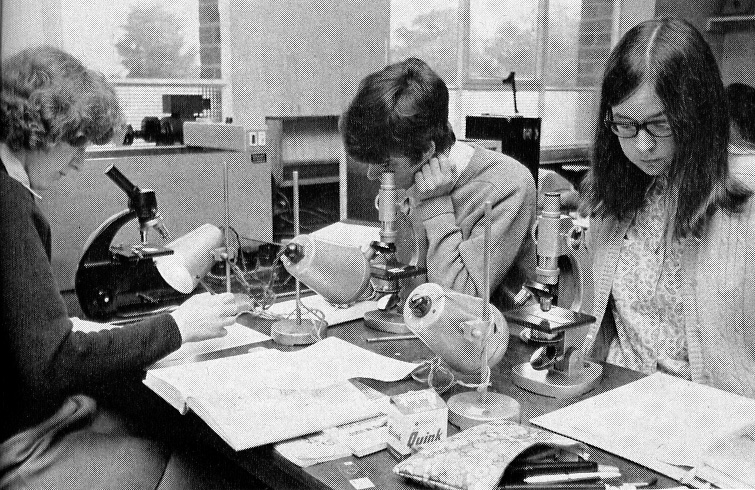
Students are
provided with some background on the teaching of immigrant children, and courses
are available for those who are interested in the education of backward and
handicapped children. “More students these days are interested in social
problems; they’re not nearly as self-centered as they once were, and I think
they have a real sense of mission.”
The rural
crafts course, under Mr. Fred Lambert, during which traditional old tools are
hand-made and used, is Unique in colleges of this kind,
Like many
training colleges, Worcester provides post-graduate courses and courses for
mature students; between fifteen and twenty married women are admitted annually
to the three-year course, though this figure may well drop if the employment
position worsens and opportunities for part-time teaching — particularly
favoured by married women — lessen. In addition, twelve American students from
New Jersey attend the College each year for the autumn term.
At the end of
the first of their three-year course, students may, if they wish, register for a
four-year course leading to a BEd. Degree awarded by Birmingham University.
Regulations for
acceptance do, however, cause the College some concern. “Students wishing to
register must have two “A” levels, and this hits at the mature student who may
not have these qualifications but may be very able. We feel that it excludes a
number of very able people. Many universities allow students to demonstrate
their ability by their work during the course. In addition, the University
decided that it would not include any subjects in the degree that it did not
teach itself. We managed to get in our Rural Studies, but the Home Economics
course was hit, and we feel that these students are being denied an opportunity
to obtain a BEd.”
A further cause
for concern is the University’s recently introduced system of awarding an
honours degree. “From 1973 the B.Ed. may be awarded as an honours degree, but so
much depends on how you interpret an honours degree.”
Other
Universities, Mr. Peirson points out, offer classified B.Ed. honours degrees,
and he fears that “better candidates for admission to Worcester have turned
their attention elsewhere. Consequently the academic level has been falling; the
proportion admitted with more than two ‘A’ levels has dropped by ten per cent,
although the number admitted with one or more ‘A’ levels now remains steady. The
College, he says, is most anxious that “nothing should happen to erode the
standard we have maintained”.
In general,
colleges of education have escaped violent demonstrations of student unrest, and
at Worcester two students sit on the governing body. “Traditionally we have very
good relations with the students. Of course, they have a strong vocational
commitment, and they do see that the course they are following is relevant to
what they eventually want to do. We don’t attract lots of people who are
violently anti-establishment; they see that there must be a framework for
society or they wouldn’t be here.” Apart from some pressure to remove the time
limit set on mixed visiting — it now stands at 11 p.m. during the week and
midnight at weekends — the only other slight demonstration of unrest was a
one-day strike in support of the teachers’ pay claim.
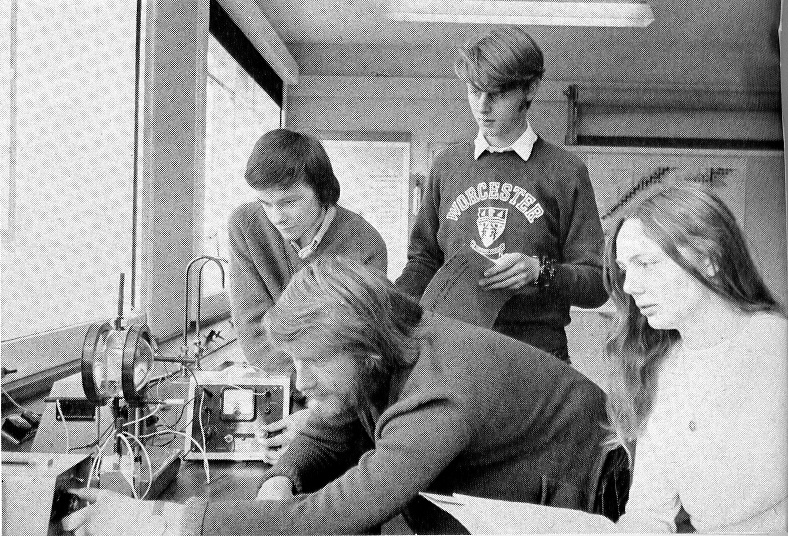
To see more photographs (Colour) CLICK HERE (Regret this link is not fully operational at the moment).
To Return to the Home Page of this site CLICK HERE
E-Mail - acadman175@yahoo.com
Please note this page is still under development.